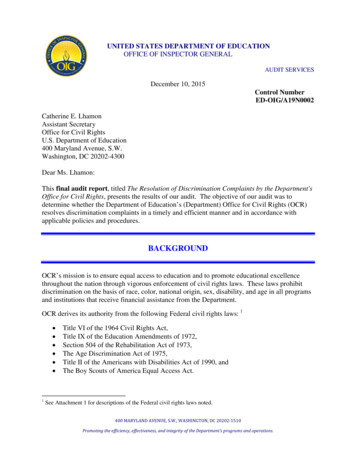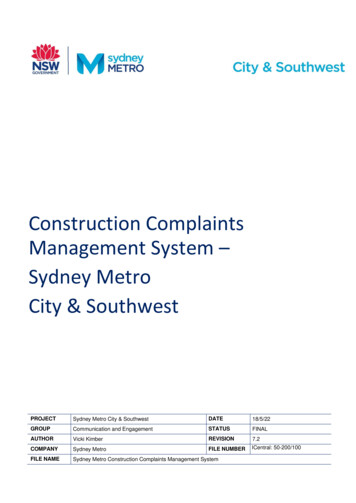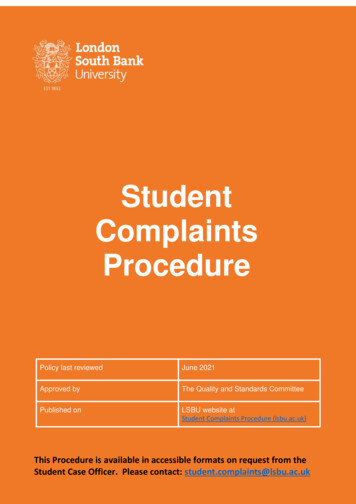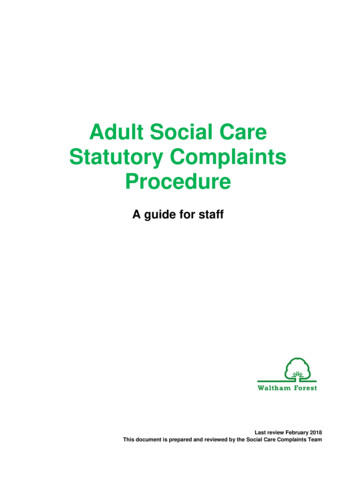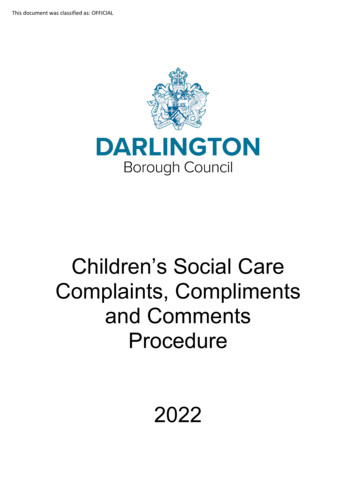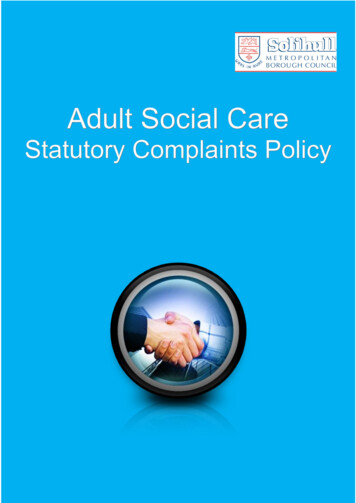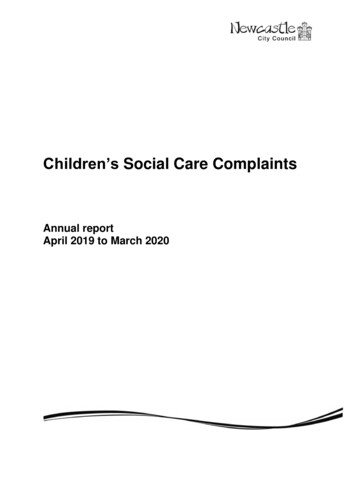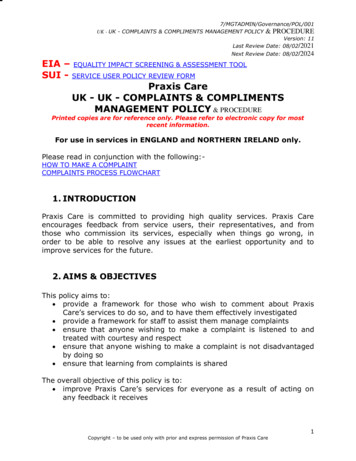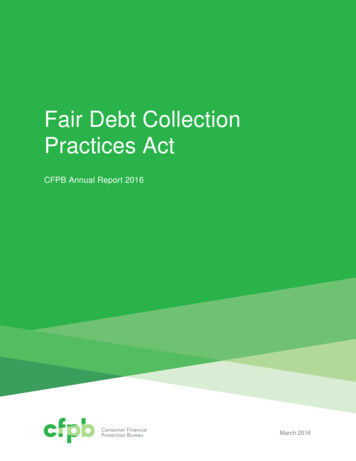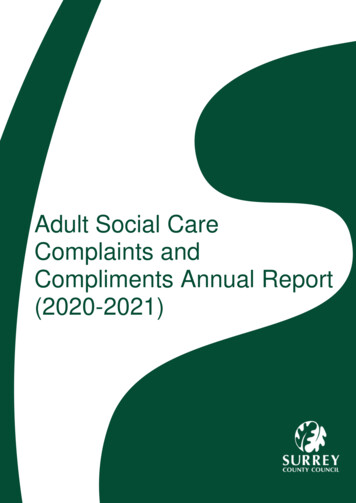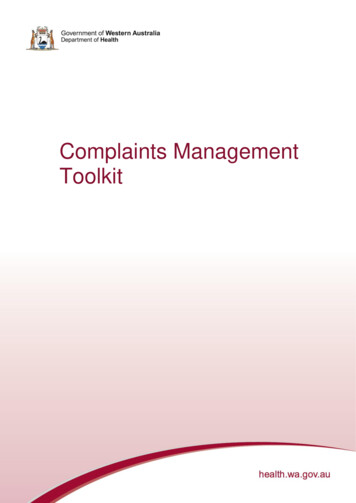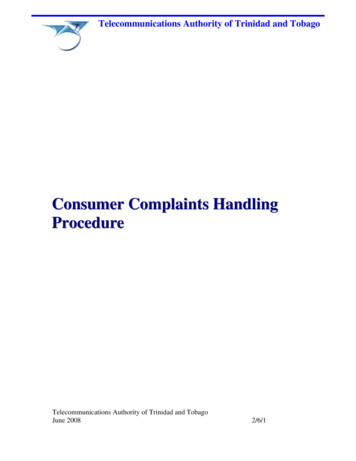
Transcription
Telecommunications Authority of Trinidad and TobagoConsumer Complaints HandlingProcedureTelecommunications Authority of Trinidad and TobagoJune 20082/6/1
Table of Contents1INTRODUCTION. 31.11.21.31.42BEFORE MAKING A COMPLAINT TO THE AUTHORITY. 62.12.22.33LODGING A COMPLAINT WITH THE AUTHORITY . 8CLASSIFICATION OF COMPLAINTS. 104.14.25LODGING THE COMPLAINT WITH THE SERVICE PROVIDER CONCERNED FIRST . 6VERIFICATION OF COMPLAINTS . 6DISMISSAL OF COMPLAINTS . 7PROCESS FOR SUBMITTING A COMPLAINT TO THE AUTHORITY. 83.14PURPOSE . 3SCOPE . 3MAINTENANCE OF THE DOCUMENT. 5DEFINITIONS . 5CRITERIA FOR CLASSIFICATION. 10ESCALATION OF COMPLAINTS . 11LEVELS OF COMPLAINTS . 135.15.25.3LEVEL 1 COMPLAINTS . 13LEVEL 2 COMPLAINTS . 14LEVEL 3 COMPLAINTS . 176THE CONSUMER COMPLAINTS COMMITTEE . 197RECORDING OF COMPLAINTS . 217.18FILING . 21COSTS . 228.1RESPONSIBILITY FOR COSTS . 22APPENDIX 1: SUMMARY OF COMPLAINTS PROCESS . 2322/6/1
1 Introduction1.1 PurposeThe Telecommunications Authority of Trinidad and Tobago (herein after called theAuthority) is charged with the responsibility of liberalizing the telecommunicationssector. As with any regulatory body, a system to address complaints from dissatisfiedconsumers of telecommunications and subscription broadcasting services offered byconcessionaires should be established.The purpose of this document is to give context and direction to the Authority’sconsumer complaints handling procedure. Under this procedure, the Authority shall:(i) Recognize, promote and protect the consumers’ right to comment andcomplain about their dealings with service providers;(ii) Provide an efficient, fair and accessible framework for resolving consumercomplaints;(iii) Identify the way in which the Authority will communicate with consumersabout the complaint handling process;(iv) Provide a mechanism for improving the quality of service from providers bymonitoring consumer complaints.1.2 ScopeThis document describes the Authority’s Consumer Complaint Handling Procedure,including guidelines for classifying and escalating consumer complaints.The Telecommunications Act 2001 1 provides for: the protection of consumers of public telecommunications and broadcastingservices the resolution of disputes involving consumers the investigation of consumer complaints.The Act states the following:1The Telecommunications Act was promulgated in 2001 and amended in 2004. This Act governs theoperations and sets the framework of the Authority.32/6/1
Section 18 (1) “ the Authority may exercise such functions and powers as areimposed on it by the Act and in particular”o Section 18 (m) “investigate complaints by users, operators oftelecommunications networks, providers of telecommunications andbroadcasting services or other persons arising out of the operation of telecommunications service or broadcasting service, in respect of rates,billings and services provided generally and to facilitate relief wherenecessary”o Section 18 (q) “establish a consumer complaints committee to collect,decide on and report on consumer complaints, such reports to be includedin the Authority’s annual report” Section 22(3) (e) “Every concession for a public telecommunications network, apublic telecommunication service or a broadcasting service shall containconditions regarding the provision of information to users and procedures forhandling and responding to user complaints and disputes” Section 78(1) “The Minister, on the recommendation of the Authority, shall makesuch regulations, subject to negative resolution of Parliament, as may be requiredfor the purposes of this Act, including regulations prescribing” o Section 78(1) (j) “procedures for investigating and resolving complaintsby users with regard to public telecommunications services”.It should be noted that while the Authority receives numerous complaints, includingcomplaints that arise between service providers and all users of telecommunications andsubscription-broadcasting services, this Consumer Complaints Handling Procedurefocuses only on complaints from consumers of telecommunications and subscriptionbroadcasting services. All other complaints in respect of public telecommunications andsubscription broadcasting services will be treated with by the Authority in accordancewith the Dispute Resolution Procedures.42/6/1
1.3Maintenance of the DocumentThis document will be modified periodically to meet changing and unforeseencircumstances. The Authority, any stakeholder in the telecommunications sector, or anymember of the public may identify the need for modification. When need formodification is identified, the identifying entity will submit the modification issue to theAuthority.Questions or concerns regarding the maintenance of the Complaints Handling Proceduremay be directed to the Authority.1.4 Definitions1.4.1Complaint – any submission from a person or other entity indicatingdissatisfaction with the services, products or facilities provided by aconcessionaire.1.4.2Complainant – person or other entity making a complaint.1.4.3Consumer 2 – Any person:a.to whom goods or services are sought to be supplied in the course of abusiness carried on by the person supplying or seeking to supply them;andb.who does not receive or seek to receive the goods or services in the courseof business carried on by him.For the purpose of these procedures, the Authority will consider complaints from personswho receive goods and services for personal use and for the purpose of business carriedout by the individual.2This definition is adopted from the Trinidad and Tobago Consumer Protection and Safety Act of 1985.52/6/1
2Before Making a Complaint to the Authority2.1 Lodging the Complaint with the Service Provider ConcernedFirstIf a consumer has a complaint about the services provided by a telecommunications orsubscription-broadcasting service provider, he/she should first lodge the complaint withthe service provider. Where the complaint has not yet been lodged with the relevantservice provider, the Authority shall direct the complainant to do so.It is the responsibility of the service provider to handle consumer complaints, inaccordance with its own complaint handling procedures.In addition, the complainant should try to obtain the name of the person he/she spokewith at the company and gather any documents relevant to the complaint, such ascontracts, bills and copies of correspondence that can be used as evidence, should thematter be referred to the Authority.2.2 Verification of ComplaintsIf a consumer is in any doubt as to whether or not a complaint should be submitted, theAuthority should be contacted at:Offices of the Authority76 Boundary Road,San Juan, Trinidad and TobagoTelephone (868) 675-8288,Fax - (868) 674-1055Email – info@tatt.org.tt62/6/1
The Authority’s Service Facility in TobagoManagement Services UnitOffice of the Chief SecretaryTobago House of AssemblyQuarters #34,Calder Hall Road,Scarborough2.3 Dismissal of ComplaintsThe following types of complaints will not be actioned by the Authority via theConsumer Complaints Handling Procedures: Frivolous complaints Vexatious complaints Anonymously submitted complaints Complaints not first lodged with the service providerFrivolous complaints are those that are either not supported by the circumstances or thatdo not raise any significant or addressable issues. Vexatious complaints are those that theAuthority determines are being pursued by the consumer only to cause inconvenience tothe service provider.While anonymously submitted complaints and complaints not first lodged with theservice provider will not be actioned, these complaints will be recorded by the Authority.72/6/1
Process for Submitting a Complaint to the Authority33.1 Lodging a Complaint with the Authority3.1.1A complaint may be lodged with the Authority when: no effort was made by the service provider to resolve the complaint; or the complainant is dissatisfied with the outcome of the complaint submitted tothe service provider; or the complainant is of the opinion that all means of resolution have beenexhausted with the service provider; or attempts by the complainant to contact the service provider has provedunsuccessful.3.1.2The complainant shall complete and sign a Complaint Form (attached atAppendix A) and provide any other relevant documentation to support the claim.A representative from the Authority can complete the Complaint Form on behalfof the complainant, however the complainant will be required to sign the form.3.1.3Complaint Forms can be obtained: On the Authority’s website (http://www.tatt.org.tt) At TTPost outlets throughout Trinidad and Tobago At the offices of the Authority - 76 Boundary Road, San Juan,Trinidad and Tobago At the Authority’s Service Facility in Tobago - Management ServicesUnit, Office of the Chief Secretary, Tobago House of Assembly,Quarters #34, Calder Hall Road, Scarborough82/6/1
3.1.4Complaint Forms must be submitted to the offices of the Authority orManagement Services Unit, Office of the Chief Secretary, Tobago House ofAssembly, Quarters #34, Calder Hall Road, Scarborough, Tobago via fax, post,e-mail or by hand.3.1.5When a complaint is submitted via fax or e-mail, the original must be submittedto the offices identified at 3.1.4 above within 14 calendar days of submitting thefax or email. If the original is not received by the Authority within this 14-dayperiod, the Authority may cease processing of the complaint.3.1.6Where it is difficult for the consumer to obtain a Complaint Form, the Authorityshall accept a signed and dated letter detailing the nature of the complaint with therelevant particulars.3.1.7The Authority shall acknowledge receipt of all complaints within seven (7)calendar days of receiving the complaint.3.1.8All information needed to support the complaint shall be submitted to theAuthority. The Authority shall treat all information submitted by a complainant asconfidential, but will forward all necessary information to the relevant serviceprovider in order to resolve the complaint.3.1.9If the Authority cannot offer assistance in the matter, the complainant shall beinformed and given an explanation.92/6/1
4 Classification of Complaints4.1 Criteria for ClassificationComplaints handled by the Authority will be classified at Level 1, Level 2 or Level 3.Table 1 summarises the criteria used by the Authority in classifying complaints. TheAuthority shall classify the complaints in accordance with the following criteria:(i) Prior opportunities for the service provider to resolve the complaint;(ii) Length of time the service provider has been dealing with the complaint;and(iii) Extent of involvement required by the Authority.Table 1Complaint ClassificationCriteriaLevel 1Level 2Prioropportunities forservice provider toresolve complaintComplaint previouslyEscalated fromconsidered by serviceLevel 1.provider but not resolved.Length of time forwhich the serviceprovider had beendealing with thecomplaintTimeframe allocated bythe service providerconsidered by thecomplainant to beunreasonable; orLength of time allocatedby the service provider toresolve the complaint hasexpired.102/6/1Level 3Escalated fromLevel 2.MaximumEscalated fromtimeframe allocated Level 2.at Level 1 hasexpired.
CriteriaLevel 1Extent ofinvolvementrequired by theAuthorityMinimal contact withboth parties needed. Theservice provider isafforded with anotheropportunity to resolve thematter with thecomplainant.Level 2Investigation,assessment andmediation whererequired.Level 3Involvement byConsumerComplaintsCommittee (CCC).4.2 Escalation of Complaints4.2.1Complaints can be escalated from one level to the next for one or more of thefollowing reasons:(i) The service provider does not respond to the complaint within the prescribedtimeframe and the complaint remains unresolved;(ii) The service provider does not, on the Authority’s request, provide relevantdocumentation, necessary to understand and/or resolve the complaint;(iii) After the available information is evaluated, the Authority does not agreewith the service provider’s response, or that the outcome achieved is fair andreasonable in all the circumstances; or(iv) Previous attempts at resolving the complaint reveal further circumstancesthat need to be investigated or considered.4.2.2A complaint will not be escalated where the service provider has requested anextension and where the Authority is satisfied that the service provider has doneall in its power to resolve this complaint within the stipulated timeframe. In such acase, the complaint will not be escalated and the service provider will be grantedan extension to the timeframe depending on the situation.4.2.3A service provider may request that the Authority reconsider the escalation of thecomplaint made against them. The request must be supported by information112/6/1
justifying the reconsideration, including how the service provider will resolve thecomplaint without the escalation.This request for reconsideration shall be directed to the Consumer ComplaintsCommittee and shall be dealt with on a case-by-case basis.122/6/1
5 Levels of Complaints5.1 Level 1 Complaints5.1.1All legitimate complaints received will be classified as Level 1.5.1.2Upon receipt of a complaint, the Authority will submit a Complaints ReportingForm to the service provider for completion. This form will include, but not belimited to: the steps taken by the service provider to respond to the complaint, an explanation as to why the complaint has not been resolved, the outstanding issues, and an estimate of the timeframe within which the service provider believes thecomplaint can be resolved.The service provider shall be required to return the requested information withinfive (5) calendar days to the Authority.5.1.3Based on the information submitted by the service provider under 5.1.2 above, theAuthority shall, by a Notice of Direction, require the service provider to:a. contact the complainant within five (5) calendar days of the Authority’sdirection;b. resolve the complaint with the complainant within a reasonable timeframe to beprescribed by the Authority in its direction; andc. provide a report on the status and/or the outcome of the complaint, to theAuthority, 5 calendar days after the time frame prescribed above in b.132/6/1
5.1.4If the complaint is not resolved, or the service provider has not responded to theAuthority within the timeframes prescribed at 3.5.2 and 3.5.3 above, thecomplaint shall be escalated to Level 2.5.2 Level 2 Complaints5.2.1If the complaint is escalated from a Level 1 to a Level 2 classification, theAuthority shall:a) Notify the service provider of the escalation and the Authority’sintention to investigate the complaint;b) Require that the service provider submit a report to the Authority onthe status of the complaint within five (5) calendar days of theAuthority’s notification in (a). The report should provide a summaryof the actions taken by the service provider to resolve the complaintand reasons for the complaint not being resolved within the stipulatedtimeframe, along with supporting evidence. Where the serviceprovider has filed a report as part of the level 1 process, the serviceprovider may rely on that report subject to any appropriate updates;c) Request that the complainant provide any additional documentationnot originally submitted in Level 1, within seven (7) calendar days, ,which may be relevant to the complaint and which may be necessaryto understand and substantiate the complaint;d) Investigate the validity of the claims made by the complainant and theservice provider in order to make a fair assessment of the complaint;ande) Mediate with the service provider and the complainant in order toencourage both parties to reach a mutually acceptable solution.142/6/1
5.2.2Investigation by the Authority may involve any of, but is not limited to, thefollowing: Collection of additional documentation or information from the serviceprovider or complainant; Review and analysis of documentation or information submitted inconnection with the complaint; Requests for specific testing by the service provider and provision of testresults to the Authority; Discussion with the complainant or the service provider; Consideration of any applicable legislation, regulation or concessionobligation;5.2.3 Consideration of industry Codes of Practice; Accessing of legal or other specialist advice.The Authority shall notify a service provider of its intention to investigate as soonas the complaint has been escalated to Level 2. The Authority’s notification shallbe made in writing to the service provider, and shall include:(i) Information to identify the complainant;(ii) The Authority’s reference number for the complaint;(iii) The name of the person(s) and his/her/their job title conducting theinvestigation;(iv) The reasons why the complaint is being investigated;(v) The issue in dispute from the complainant’s perspective, which may includeany relevant information submitted by the complainant to the Authority;(vi) A request for any additional information or documentation relevant to thecomplaint;(vii) Any directions for appropriate interim arrangements such as suspension ofcredit management on the complainant’s account; and152/6/1
(viii) The date by which the Authority requires the service provider’s response.5.2.4The Authority shall also notify the complainant of its intention to investigate thematter as soon as the complaint has been escalated to Level 2. The notificationshall include: A request for any additional information as may be required by theAuthority; and A prescribed timeframe in which a response can be expected from theAuthority in relation to any interim arrangement or further updates onthe status of the complaint.5.2.5The Authority shall forward a copy of the notification to the service providerunder 5.2.3 above to the complainant, and shall also copy the notification to thecomplainant under 5.2.4 above to the service provider.5.2.6When investigating a complaint, the Authority shall examine and weigh theavailable evidence in any given case, including documentation submitted by bothparties, oral statements to the Authority, and the actions of either party before andafter the submission of the complaint.5.2.7Unless a complainant has reasonable grounds for not supplying all documentationrequested, the Authority will not proceed with an investigation unless and untilsuch documentation has been submitted.5.2.8Within fourteen (14) calendar days of completing an investigation, the Authorityshall engage both parties in a mediation session in order to encourage the partiesto consider each other’s arguments and evidence and agree on a mutuallyacceptable outcome.5.2.9If a mutually acceptable solution is reached under 5.2.8 above, the Authority willrecord the terms of the agreement in writing, to be signed by both parties. It willdirect the service provider and the complainant to resolve the matter in162/6/1
accordance with the agreed solution and within a timeframe to be agreed by bothparties at the mediation session. This too will be reduced into writing.5.2.10 Subsequently, the service provider shall notify the Authority within the agreedtimeframe under 5.2.9 as to whether the matter has been resolved with thecomplainant.5.2.11 If a mutually acceptable solution is not reached under 5.2.8 above, or thecomplaint has not been resolved in accordance with the agreed solution within thetimeframe under 5.2.9 above, the Authority shall escalate the complaint to Level 3and refer the matter to the Consumer Complaints Committee (CCC) described atSection 6.5.3 Level 3 Complaints5.3.1The Authority shall notify the service provider and the complainant of its decisionto refer the complaint to the Consumer Complaints Committee (CCC) withinseven (7) calendar days of its decision being made.5.3.2The Authority shall submit the Level 3 complaints, including all relevantdocumentation or information to the CCC. A Meeting of the CCC shall beconvened to consider the complaintsat least five (5) calendar days afterreceiving the complaints.5.3.3At the meeting, the CCC will review the complaint and determine a schedule tobe followed by both the CCC and the parties involved. The purpose of thisschedule will be to ensure that the matter is dealt with in an expeditious manner,while allowing the parties adequate opportunity to prepare any additionaldocuments or information that may be required by the CCC. This schedule shouldbe no longer than twenty-eight (28) calendar days.172/6/1
5.3.4On reviewing the complaint, the CCC shall determine whether any additionalsupporting evidence or documents are to be submitted by either the complainantor the service provider. The deadline for submission of these documents shall bein accordance with the schedule set out under 3.8.3 above.5.3.5Where required after evaluation of the evidence, the CCC shall schedule ameeting with both parties to obtain further information on the complaint and toaid in the decision-making process.5.3.6All decisions of the CCC shall be made by a majority vote of the members of thecommittee.5.3.7After deliberation, the CCC shall communicate its final decision to the Authorityand to the parties involved. The final decision will be first communicated orally ata meeting convened by the CCC with both parties, and then followed by a writtendecision within 7 calendar days of that meeting.5.3.8The decision of the CCC shall be binding on the parties and shall take effectwithin 14 calendar days of the written decision, or as otherwise determined by theCCC.5.3.9In accordance with Section 83 of the Act, if any party is dissatisfied with thedecision of the CCC, a written appeal can be made to the Authority withinfourteen (14) calendar days of the CCC’s decision.5.3.10 Either party to the complaint, or the Authority, may request an amendment to thedecision on the grounds of the decision containing typographical errors. The CCCmay amend its written decision within 14 days of receipt of the request. Bothparties shall be informed of the amendment and the amended version of the finaldecision shall be issued to both parties within 7 days of the amendment beingmade.5.3.11 The decision of the CCC will be filed by the Authority.182/6/1
6 The Consumer Complaints Committee6.1.1The Consumer Complaints Committee (CCC), established under Section 18(1)(q)of the Act, shall meet at least once every three months, or as required, to deal withLevel 3 complaints. The CCC shall conduct itself in accordance with thefollowing principles: Independence; Impartiality; Transparency; Participatory Dialogue (parties must have a fair opportunity to presenttheir viewpoint); Effectiveness (ensuring minimal cost and timely resolution); Fairness; Representation (parties shall be allowed representation or assistance by athird party at all stages of the procedure). 6.1.2Simple procedureThe CCC shall be comprised of at least three individuals as follows: A member of the Board of the Authority A staff member of the Authority An individual external to the Authority to be selected in accordance withcriteria determined by the Authority6.1.3The CCC may retain additional expertise to assist in resolving particular cases,including but not limited to representatives of the following bodies: Ministry of Legal Affairs (Consumer Affairs Division) The Tobago House of Assembly192/6/1
6.1.4 Network of Non Governmental Organizations The Law Association of Trinidad and Tobago Copyright Organization of Trinidad and Tobago Trinidad and Tobago Chapter of Disabled People International Association of Professional Engineers of Trinidad and Tobago National Trade Union Centre Association of Community and Village CouncilsThe CCC may also determine the escalation of complaints to Level 3 whenrequired, based on reports submitted to it by the Authority.202/6/1
7 Recording of Complaints7.1 Filing7.1.1All complaints received by the Authority shall be logged in the Authority’s filingsystem and assigned a file number.7.1.2A system will be developed for recording the history and progress of a complaintand for the purpose of generating reports.7.1.3All significant progress in processing a complaint, including escalations and anycontact with the parties shall be recorded by the Authority. The Authority shallretain all information and material collected throughout the complaints handlingprocess in accordance with the Authority’s Records Retention Policy.212/6/1
8 Costs8.1 Responsibility for Costs8.1.1The complainant and the service provider shall bear their own costs incurred inthe complaints handling process for Level 1 and Level 2 complaints, unlessotherwise decided by the CCC. Where a complaint has been escalated to Level 3and costs are incurred, the CCC shall determine the manner in which costs shouldbe recovered.222/6/1
Appendix 1: Summary of Complaints Process232/6/1
Level 1 Complaint242/6/1
Level 2 Complaint252/6/1
Level 3 ComplaintComplaints Classified as Level 3Complaint to be referred to CCC within7 days of escalationNotification of escalation to be sentto service provider and complainantCCC to convene meeting within 5 daysof receiving complaintCCC to determine time schedule forcomplaintRequest by CCC for additionalinformation from service provider and/or complainantMore informationneeded from parties?YesNoCCC to evaluate evidence, ifnecessary meet with parties, andmake a decisionCCC to relay decision to all parties (incl.the Authority) followed by a writtendecision in 7 daysYesCase closedParties satisfied withCCC decision?NoWritten appeal made to the Authority262/6/1
Complaints not first lodged with the service provider Frivolous complaints are those that are either not supported by the circumstances or that do not raise any significant or addressable issues. Vexatious complaints are those that the Authority determines are being pursued by the consumer only to cause inconvenience to the service provider.
